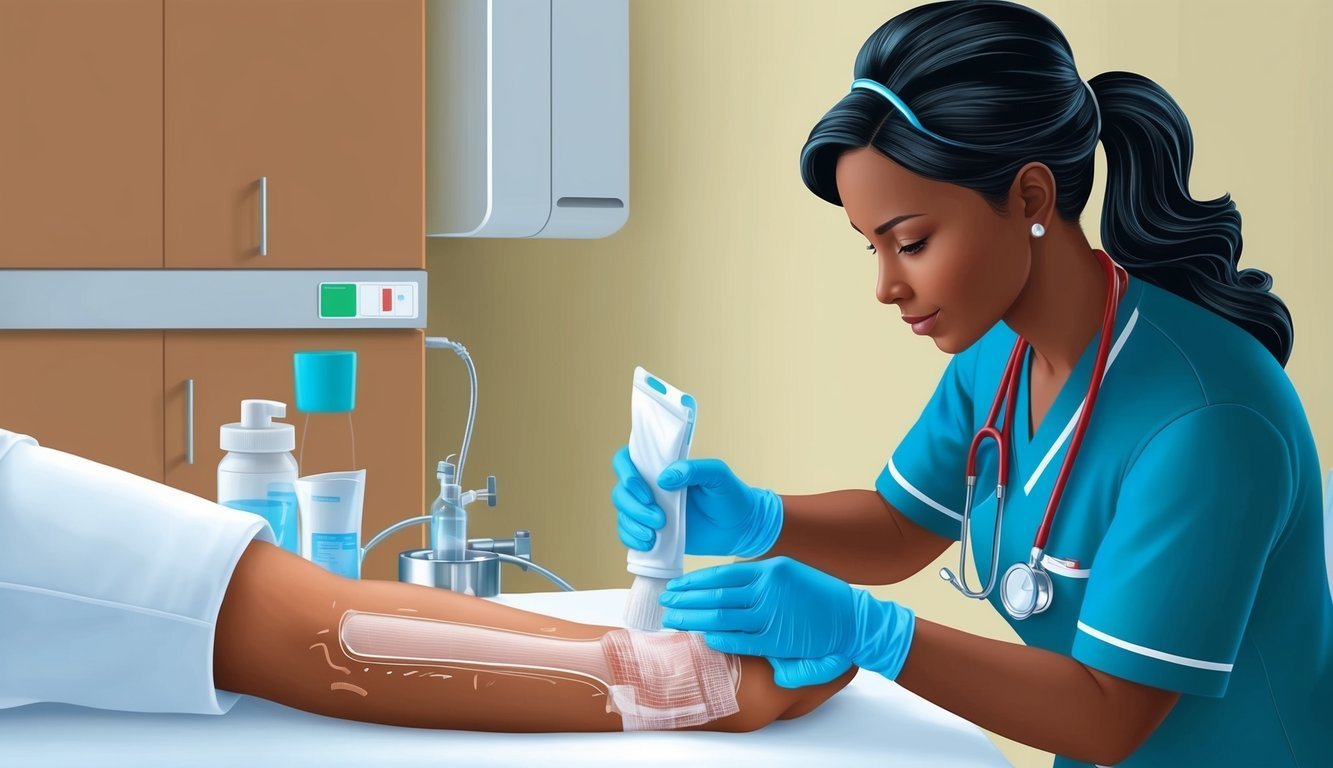Becoming a wound care nurse can be a fulfilling career choice for those passionate about helping patients heal. To pursue this rewarding role, you will need to earn your nursing degree, gain clinical experience, and obtain specialized certification. This journey not only enhances your skills but also opens up various opportunities in healthcare settings, such as hospitals and nursing homes.
As a wound care nurse, you play a crucial role in assessing and managing wounds to promote healing and prevent complications.
The combination of education, practical skills, and certification will prepare you for the challenges of this specialty.
With a growing demand for wound care professionals, you can look forward to a stable and rewarding career.
In this article, you will discover the steps needed to become a wound care nurse, from educational pathways to clinical experience, all designed to guide you on this important journey.
Key Takeaways
- You need a nursing degree and specialized certification to become a wound care nurse.
- Clinical experience is vital for developing skills in wound management.
- There are many career advancement opportunities in the field of wound care nursing.
Understanding the Role of a Wound Care Nurse

A wound care nurse plays a vital role in promoting effective wound healing and preventing complications.
This profession focuses on assessing, treating, and managing various types of wounds, ultimately enhancing patient outcomes and quality of life.
Scope of Practice
As a wound care nurse, you specialize in assessing and treating complex wounds, such as pressure ulcers, diabetic foot care, surgical wounds, and burns.
Your responsibilities include:
- Patient Assessment: You evaluate the wound and surrounding skin to determine the best course of action.
- Treatment Planning: You develop individualized care plans that may incorporate various dressings and therapies.
- Infection Control: You monitor for signs of infection and implement appropriate interventions when necessary.
- Education: Teaching patients and families about wound care and prevention strategies is crucial for recovery.
Your expertise in managing chronic wounds contributes to better healing rates and reduced complications.
Work Environment
Wound care nurses typically work in diverse settings, including hospitals, outpatient clinics, and home health care.
Each environment presents unique challenges and opportunities:
- Hospitals: In hospitals, you may work closely with a multidisciplinary team, collaborating with physicians and other nurses for comprehensive care.
- Outpatient Clinics: These settings allow for focused care management, where you can build long-term patient relationships.
- Home Health: Providing care in patients’ homes can be rewarding, granting you insight into their living conditions, which can affect wound healing.
Adapting to each environment is key to addressing the varied needs of your patients.
Impact on Patient Outcomes
Your role significantly impacts patient outcomes.
Effective wound care can improve healing times, reduce hospital stays, and enhance quality of life.
Some critical areas include:
- Skin Breakdown Prevention: You educate patients on avoiding skin breakdown, especially for those at high risk, such as the elderly and diabetic individuals.
- Wound Healing: Timely and appropriate interventions can accelerate healing and prevent chronic wounds, which can lead to serious complications.
- Quality of Life: By managing pain and infection, you help restore comfort and mobility for your patients.
The dedication you bring to your practice directly influences recovery and long-term health.
Educational Pathways

To become a wound care nurse, following clear educational pathways is essential.
You will need to earn the right nursing degree and undergo specialized training.
Online options can also provide flexibility while pursuing your education.
Nursing Degrees
The first step is obtaining a nursing degree.
You can pursue either an Associate Degree in Nursing (ADN) or a Bachelor of Science in Nursing (BSN).
| Degree Type | Duration | Description |
|---|---|---|
| ADN | 2 years | Prepares you for entry-level RN positions. |
| BSN | 4 years | Provides a comprehensive nursing education, including advanced topics like patient care and leadership. |
While both degrees allow you to become a Registered Nurse (RN), a BSN is typically required for specialized roles like wound care nursing.
Employers often prefer RNs with higher degrees due to their advanced training.
Specialized Training
After earning your nursing degree, additional specialized training is important for wound care nursing.
You will learn how to assess and manage complex wounds effectively.
Specialized training programs often cover areas such as:
- Wound assessment techniques
- Treatment modalities
- Patient care and education
Certification can enhance your skills and job prospects.
You might consider certifications from the Wound Ostomy and Continence Nursing Certification Board, which focuses specifically on wound care.
Online Nursing Degree Programs
Online nursing degree programs offer flexibility for your education.
Many accredited schools provide options for both ADN and BSN degrees online.
Advantages of online programs include:
- Flexible scheduling: Learn at your own pace and balance your studies with personal commitments.
- Accessibility: Access high-quality educational resources from anywhere.
However, ensure that any program you choose is accredited.
Look for programs that also provide clinical experiences, as hands-on training is crucial in nursing.
You can explore various online options through resources like Nursing Education.
Certification and Licensure
To practice as a wound care nurse, you must obtain both national certification and state licensure.
Each of these requirements ensures you have the knowledge and skills necessary to provide high-quality care.
Additionally, staying certified involves ongoing education and renewal processes that keep your skills current.
National Certification
National certification is important for wound care nurses.
You can pursue certifications such as the Certified Wound Care Nurse (CWCN) and the Certified Wound, Ostomy, and Continence Nurse (CWOCN).
These certifications are offered by the Wound, Ostomy, and Continence Certification Board (WOCNCB).
Requirements for CWCN include:
- Hold a valid RN license.
- Complete a BSN or equivalent nursing degree.
- Gain experience in wound care.
The certification exam tests your knowledge on wound assessment, treatment, and management.
You can check out the details by visiting the WOCNCB for more information.
State Licensure
In addition to national certification, you must obtain state licensure.
This process varies by state but generally involves the following steps:
- Graduate from an accredited nursing program.
- Pass the NCLEX-RN exam to become a registered nurse.
- Apply for a nursing license in your state.
Some states may require additional certifications or specific training in wound care before granting a license.
It’s essential to check your state’s nursing board for particular requirements.
Most states offer information online, making it easier to understand what is needed.
Renewal and Continuing Education
After achieving certification and licensure, you’ll need to keep them current.
Renewal typically occurs every 3-5 years, depending on the certification.
To maintain your certification, you must complete continuing education credits.
This can include:
- Attending workshops or seminars.
- Completing online courses related to wound care.
- Participating in clinical practice.
Staying updated is vital as wound care practices continue to advance.
The National Alliance of Wound Care and Ostomy offers resources for ongoing education and certification renewal.
Always check for specific renewal requirements based on your certification through official resources.
Clinical Experience and Skills Development
Gaining clinical experience and developing specialized skills are essential steps in becoming a successful wound care nurse.
Knowledge and hands-on training help you manage complex wound conditions effectively.
Practical Training
To become a wound care nurse, you need hands-on clinical experience.
Most certification programs require completion of a certain number of clinical hours.
You will work under the supervision of an approved preceptor in settings like hospitals and nursing homes.
During this training, you will learn essential wound assessment techniques.
Observing and participating in wound treatments will enhance your practical skills.
Aim for at least 120 hours of direct patient care to grasp the intricacies of wound management.
Specialized Wound Care Procedures
Specialized training in wound care procedures is vital.
This includes understanding various wound types and the appropriate treatments.
You will learn about techniques such as debridement, dressing changes, and infection control.
As part of your training, you will also focus on ostomy care.
This requires knowledge of skin protection and patient education.
Being proficient in these areas will set you apart as a wound care specialist.
Consider enrolling in a wound, ostomy, and continence nursing program.
These courses will give you a comprehensive understanding of skin and wound management practices.
Interdisciplinary Collaboration
Collaboration with other healthcare professionals is crucial in wound care.
You will often work alongside doctors, physical therapists, and dietitians to develop comprehensive care plans.
Effective communication skills are key to ensure that all team members are informed about a patient’s progress.
Staying updated on the latest wound care practices and evidence-based methods will also enhance your care approach.
Join professional networks or attend workshops to connect with other wound care professionals.
This collaboration will help you stay current with evolving treatment options.
Career Advancement and Opportunities

As a wound care nurse, there are various paths for career advancement and specialized opportunities.
Understanding your options can help you plan your professional journey effectively.
Advancing in the Field
To advance in wound care nursing, obtaining specialized certifications is essential.
The Wound Ostomy and Continence Nursing Certification Board (WOCNCB) offers several credentials.
Popular options include the Certified Wound Care Nurse (CWCN) and the Certified Wound Ostomy Continence Nurse (CWOCN).
These certifications can significantly enhance your skills and marketability.
In addition, pursuing further education, such as a Master’s or Doctoral degree in nursing, can open doors for leadership roles.
Some nurses move into positions overseeing wound care departments or teaching others in the field.
For more details on certification and its benefits, check the WOCNCB website.
Specializations and Career Paths
Wound care nursing has various specialization options that can diversify your career.
Some areas include:
- Certified Foot Care Nurse: Specializing in diabetic foot care and wound management.
- Certified Ostomy Care Nurse: Focusing on patients with ostomy needs.
These specialized roles require additional training and exams but can lead to increased responsibilities and job satisfaction.
Networking through organizations like the Wound, Ostomy, and Continence Nurses Society (WOCN Society) can also lead to new opportunities and insights into best practices in wound care.
Salary Expectations and Job Market
The salary range for wound care nurses can vary based on education, experience, and location.
According to recent data, salaries typically range from $60,000 to $95,000 annually.
Factors such as certification and advanced degrees can significantly impact earnings.
The demand for skilled wound care nurses is growing due to an aging population and increasing awareness of chronic wounds.
Job prospects are strong in hospitals, outpatient facilities, and home health settings.
You can stay informed on salary trends and job opportunities through resources like Nurse.org.
Frequently Asked Questions

This section addresses common queries about becoming a wound care nurse.
You will find essential information on educational requirements, certification processes, salary expectations, and career opportunities.
What are the educational requirements to become a wound care nurse?
To become a wound care nurse, you typically need a Bachelor of Science in Nursing (BSN) degree.
Some programs allow entry with an Associate’s Degree in Nursing (ADN), but a BSN is preferred for certification.
After obtaining your degree, you must pass the NCLEX-RN exam to become a registered nurse.
What is the process to obtain wound care certification?
To gain wound care certification, you must complete nursing practice and education requirements.
After that, you can apply to take the wound care certification exam.
This often includes specific coursework and hands-on experience in wound management.
Are there specific wound care certification programs for LPNs?
Yes, there are certification programs available for Licensed Practical Nurses (LPNs) who wish to specialize in wound care.
These programs provide the necessary training and education to help LPNs meet certification requirements.
Check specific organizations for approved programs.
What is the typical salary range for a wound care nurse?
The typical salary for a wound care nurse can range from $60,000 to $90,000 annually, depending on experience and location.
Factors such as the healthcare setting and additional certifications may also influence salary.
How long is the training and certification process for a wound care nurse?
Becoming a wound care nurse generally takes about four to six years.
This includes earning your BSN and gaining relevant work experience.
After that, additional training for certification may take another six months to a year.
What are the career prospects and benefits of becoming a wound care nurse?
Wound care nurses have strong career prospects.
This is because there is a growing need for specialized care in healthcare settings.
Benefits of this career include job stability, opportunities for advancement, and the chance to make a significant impact on patients’ healing processes.

